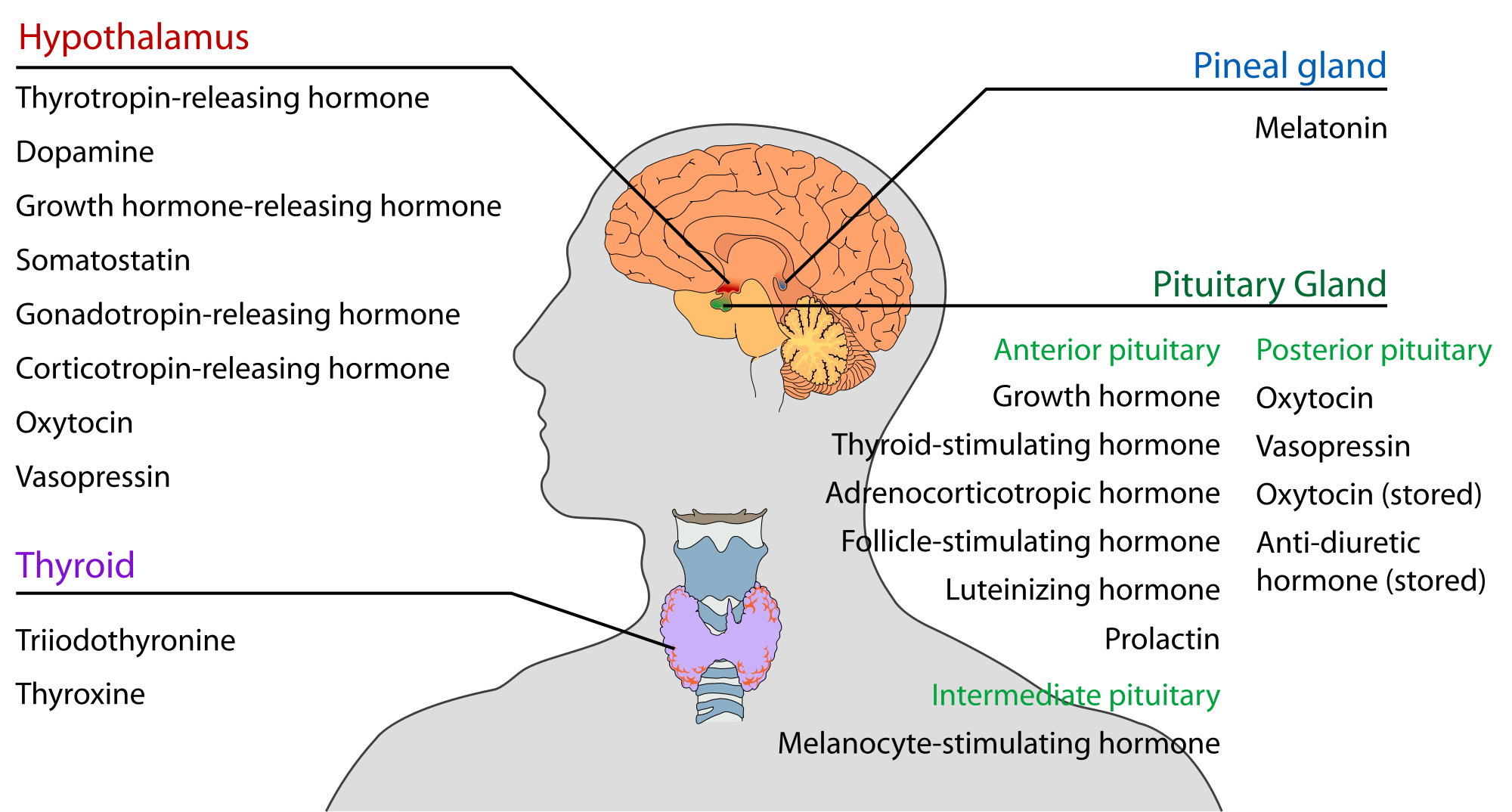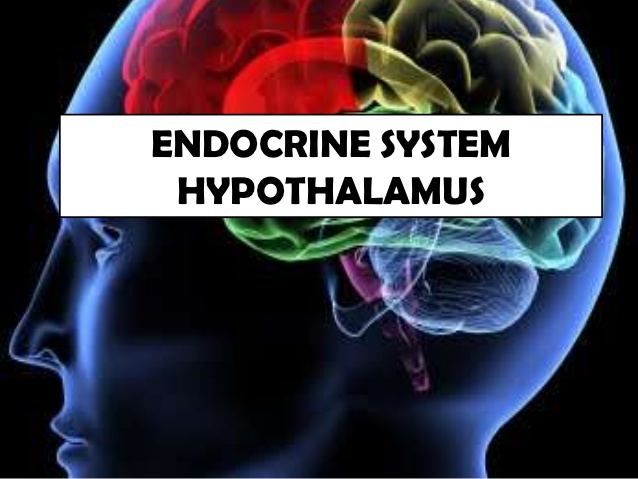The hypothalamus is located below the thalamus (a part of the brain that relays sensory information) and above the pituitary gland and brain stem. It is about the size of an almond.
The Hypothalamus is the region of the forebrain that contains hormone secreting cells and interacts with the pituitary gland at the base of the hypothalamus. It is considered a neural control center for the Endocrine System and links to the Nervous System. It is the part of the brain that helps stimulate or inhibit key processes in your body. It is referred to as a “Gland.” The Hypothalamus tells the Pituitary Gland what hormones to release and when. It is responsible for balance or homeostasis.
- the tendency toward a relatively stable equilibrium between interdependent elements, especially as maintained by physiological processes.
Homeostasis can be defined as a property of an organism or system that helps it maintain its parameters within a normal range of values.
The hypothalamus produces the hormones that regulate body temperature, thirst, sleep, moods, sex drive and the circadian rhythm. It provides a set point of homeostasis for electrolytes, body temperature, blood pressure and weight. According to the US National Library of Medicine, it also controls the pituitary gland.
It is highly involved in the Pituitary Gland function. When it receives a signal from the nervous system, it secretes hormones that start and stop the pituitary glands hormone production.
The major endocrine glands include the pineal gland, pituitary gland, pancreas, ovaries, testes, thyroid gland, parathyroid gland, and adrenal glands. In vertebrates, the hypothalamus is the neural control center for all endocrine systems.
The Endocrine System links to the Nervous System.
- Growth and development
- Homeostasis (the internal balance of body systems)
- Metabolism (body energy levels)
- Reproduction
- Response to stimuli (stress and/or injury)
Hormone levels that are too high or too low indicate a problem with the endocrine system. Hormone diseases also occur if your body does not respond to hormones in the appropriate ways. Stress, infection, and changes in the blood’s fluid and electrolyte balance can also influence hormone levels, according to the National Institute of Health.
Diabetes, Hormonal Imbalances, Hypothyroidism, and Hypoglycemia are common problems in the Endocrine System. Infections and medications such as blood thinners can also cause adrenal deficiencies.
Cancer can attack them all. Hyperthyroidism, Adrenal Failure, Hypertension, and Diabetes can be brought on by stress and cause fatigue, affecting sleep and mood.
The Hypothalamus maintains the body’s internal balance; or homeostasis. It controls the Pituitary Gland, or what is sometimes called “The Master Gland of the Endocrine System”
Upper Endocrine Glands

Hormones secreted by the Hypothalamus:
- Anti-diuretic hormone (ADH): This hormone increases water absorption into the blood by the kidneys. This is also known as Vasopressin.
- Corticotropin-releasing hormone (CRH): CRH sends a message to the anterior pituitary gland to stimulate the adrenal glands to release corticosteroids, which help regulate metabolism and immune response.
- Gonadotropin-releasing hormone (GnRH): GnRH stimulates the anterior pituitary to release follicle stimulating hormone (FSH) and luteinizing hormone (LH), which work together to ensure normal functioning of the ovaries and testes.
- Growth hormone-releasing hormone (GHRH) or growth hormone-inhibiting hormone (GHIH) (also known as somatostain): GHRH prompts the anterior pituitary to release growth hormone (GH); GHIH has the opposite effect. In children, GH is essential to maintaining a healthy body composition. In adults, it aids healthy bone and muscle mass and affects fat distribution.
- Oxytocin: Oxytocin is involved in a variety of processes, such as orgasm, the ability to trust, body temperature, sleep cycles, and the release of breast milk.
- Prolactin-releasing hormone (PRH) or prolactin-inhibiting hormone (PIH) (also known as dopamine): PRH prompts the anterior pituitary to stimulate breast milk production through the production of prolactin. Conversely, PIH inhibits prolactin, and thereby, milk production. Thyrotropin releasing hormone (TRH): TRH triggers the release of thyroid stimulating hormone (TSH), which stimulates release of thyroid hormones, which regulate metabolism, energy, and growth and development.
- Dopamine – A neurotransmitter that regulates pleasure and reward.
- Somaostatin – Secreted by the Hypothalamus and derived from an amino acid, this inhibits the secretion of other hormones, such as growth hormone and insulin. They also regulate gastroinstestinal functions.
It is difficult for doctors to determine if a condition is associated with the Hypothalamus or the Pituitary Gland because they are so closely connected. Hormone tests can help narrow down the root of the problem related to hormonal / chemical imbalances.
The glands produce different types of hormones that evoke a specific response in other cells, tissues, and/or organs located throughout the body. The hormones reach these faraway targets using the blood stream. Like the nervous system, the endocrine system is one of the body’s main communicators. But instead of using nerves to transmit information, the endocrine system uses blood vessels to deliver hormones to cells.
How is it linked to the Pituitary Gland and what is it’s interaction and primary function?
It starts and stops Pituitary Gland hormones.
These glands appear to have a hierarchical design with linkages that start and stop anothers’ production to manage a constant balance through the bloodstream and nervous system.
Endocrinologist are the specialist that diagnose and treat problems with the Hormone System.
Common Hormonal Problems:
Hyperthyroidism
Tumors
Reproduction
Lactation
Kidney Failure
Delay in Contractions in Childbirth
Growth of muscles
Adrenalin or Energy/Excitement
Obesity or Weight Gain
Stress
Diabeties
Osteoperosis
Testosterone
Menopause
Hyperglycemia

Can I simply say what a aid to find somebody who truly is aware of what theyre speaking about on the internet. You undoubtedly know how to bring a problem to mild and make it important. More people must learn this and understand this side of the story. I cant consider youre not more widespread since you definitely have the gift.